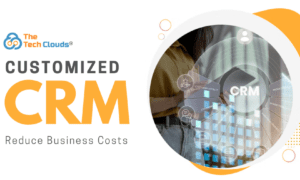CRM software tools were initially developed to help businesses establish and maintain relationships with new and current customers. Later on, they evolved from a contact management tool into a powerful solution that helps manage sales, marketing, accounting, point-of-sale (POS) transactions, vendors, and other types of operational data — all in one platform.
But choosing the right CRM for your business is never easy. These 15 tips will help you to choose the right CRM software for your business.
1. Identify your business requirements and goals
Know the kinds of problems you are attempting to solve with a CRM. Set the listed objective below in order of necessity to your business to identify which CRM solution will be the most successful:
- Monitor leads and lead activity.
- Monitor user base.
- Monitor opportunities and closing rates.
- Provide connectivity between employees.
- Handle relationships.
- Produce tailored reporting.
- Run business operations.
- Grow marketability.
- Grow productivity.
2. Ask for insights from different teams and departments
Sales, marketing, and service teams using a CRM ecosystem should be asked for insights during the decision-making process. Although the sales team is the one that generally uses a CRM, it is vital to gather feedback via Feedback button from all users so that you can come up with a decision that will be beneficial to the whole organization.
3. List down all the crucial features that you will need
Do not miss customer support and data security when making feature lists. When choosing a CRM solution, ensure that it can keep your data safe. Watch out for features such as advanced user permission and two-factor authentication.
It also needs a dependable customer service tools that is easily reachable across different channels. It should provide phone, email, and live chat support. For those employers who work remotely, ensure remote employee engagement for positive outcomes in customer service.
For a more comprehensive list, draft two: 1) must-have features and 2) nice-to-have features. A features shopping list comprises CRM features important to your business missions. It should include powerful contact management settings, file transfer, lead and opportunity management, and sales forecasting, just to name a few. Meanwhile, your nice-to-have list should include CRM features that will not prevent you from reaching your business goals if you do not have them.
You can hire a Shopify eCommerce development company to help you with the software.
4. Look into the best CRMs that suit your needs
Talk to your peers, colleagues, and other business leaders about the CRMs they use and if they are satisfied with them. Discover what they deem as CRM strengths and weaknesses and whether they would speak favorably of them or not.
Print and online materials can also be good sources of information. Consider using business-related pictures and other stock photos to have a solid visual representation. Read existing reviews posted online from reliable firsthand experiences of customers.
5. Examine vendor vision, roadmap, feasibility, and support
Since CRM software is a long-term investment, you must thoroughly assess the potential benefits a vendor can provide you.
Review their product vision and roadmap, including their market view, take on installable software versus SaaS, and so on. Take a look at their product positioning and marketing narrative. Check out their financial status so software migration will not disrupt your business.
Other things to be wary of are product support processes, responsiveness, accessible support tools, and service-level agreements. Also, consider their global presence, like if support is available during office hours across time zones.
You should also delve into the regional footprint of SaaS solutions, how much does it cost to develop saas, and how they carry out low-latency services to various locations.
6. Try CRMs by signing up for free trials and live demos
Take advantage of free trials offered by CRM providers. Free trials should give access to all CRM features, enabling a complete assessment and offering ample free trial days to get a full-scale sense of the software.
To maximize free trials, create a trial team composed of employees from different teams. Have one or two members from every department participate in the free trial, so you can collect feedback from them. Eventually, you can consider having staff appreciation awards to motivate employees and appreciate their extra efforts.
Some important notes to observe during a CRM trial period are:
- If the features are working as promised.
- Usability of the CRM regardless of technical know-how.
- Usability of mobile apps.
- Noticeable lags.
- The intuitiveness of the user interface.
You may also request a live demo, video streaming and have your members attend it. Your team can ask questions and learn more about the software. Live demos are your chance to put the software to the test and determine its strengths and weaknesses. People will often watch a demo only to have a glance at it. Take your time, as this phase will save you lots of time in the long run.
7. Choose a vendor that is industry-specific and has local partners.
The industry you belong to may be too specific; thus, choose a CRM vendor that has partnered with businesses and industries that are the same as yours.
Browse a vendor’s website to know the sizes and types of businesses it teams up with. Also, review sites for references, scores, and customer feedback.
Consider a vendor’s local partner network too. Many businesses prefer to have a local partner to deliver local support during and beyond the implementation of the CRM.
8. Confirm the availability of training and customization
A CRM tool should be well-configured. Your staff members should also be able to attend training sessions before using its features. So, ask the price for configuring the tool for your business and conducting training sessions.
Choose a system that can be easily configured to complement your business and mirror your sales processes, marketing strategies, customer support operations, and contact management habits.
On the other hand, training is one of the essential facets of a seamless CRM implementation. It should be a continuous, user-specific experience so everyone can use it to refine their efficiency.
Whether an individual, a group, or role-based, CRM training shows how the software works, how everything is connected, and how a user plays a role in the overall business workflow.
9. Find a tool that can be accessed using any device
Your team of sales professionals is most probably mobile and using various devices. Find a tool that can be accessed using different web-hosted devices. Keep in mind that most sales professionals have adopted technology ahead of everyone; hence you should choose software that will be updated regularly and keep up with the latest in the industry.
10. Explore a CRM’s flexibility
CRM tools are built based on a variety of business processes. Every company’s processes are different, but specific processes can give them an edge over its competitors. Your CRM must be flexible & Asus 2-in-1 Q535 so that it can facilitate your processes.
At the same time, it is only logical to aim for a CRM that will improve your business and adjust to your evolving processes without having to be replaced.
11. Assess compatibility with existing software
Compatibility with numerous systems is not an issue now as more software solutions are API-connected. However, ensuring that your preferred CRM can work well with other systems is still important. Contact a third-party platform provider if you are having problems integrating all of your systems through APIs.
12. Inquire about reporting abilities
Although all of a CRM’s functionalities are great, its reporting abilities can help you in your business. Its ability to tailor reports based on data will display your wins, losses, and room for improvement. If you think that your processes are already effective, your data may uncover hidden surprises.
Ensure your team is confident enough to input the correct customer data. This will become very useful in identifying the appropriate services, products, pricing, and delivery conditions for your business.
13. Comprehend the implementation
Every time new software is changed or introduced, there is always an implementation period. In some circumstances, you may have to hire a third-party staff person or consultant to lead the deployment. There will also be a training and testing period where some issues will be fixed, and best practices will be set.
Aside from the implementation costs, there will still be costs when it comes to educating your staff on the system and transferring your data into the new software.
14. Put your team at ease
There will be staff members who will not like the change. Some of them may even feel threatened. This is a typical complaint among sales professionals, as they think giving up their customers’ information will put their jobs at risk. Time tracking software, plays an immense role in tracking the employees’ worked hours. It makes easier to increase the productivity.
What you can do is to put them at ease and explain that sharing or losing their customers with others will not harm them in any way because they own personal relationships with the customers.
Doing this will make them adopt the new system and, in turn, help their coworkers adopt it. Time tracking tools are also essential for coworkers to organize their time properly and develop successful time and work management skills.
15. Choose the right CRM carefully
Choosing the right CRM software involves careful planning and research. Not all CRMs are created equally, and each fits specific business requirements.
Make sure that all fundamental elements are considered, most importantly, your business needs and objectives. Gather your team and determine the key features that will bring you success.
Take as much time as you need to follow these measures we have prepared for you, and you will save money, time, and effort and help you make the right decision for your business. Here is a list of the best CRM software tools to further guide your CRM selection process.



































